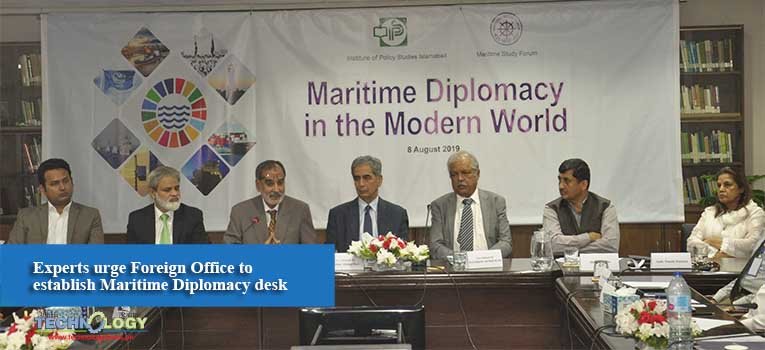Experts and diplomats at a seminar at Institute of Policy Studies on “Maritime Diplomacy in the Modern World” were unanimous of the view that all policy institutions and maritime stakeholders in Pakistan need to put their act together to further the nation’s interests across the globe in the maritime domain.
 In the age of grey hybrid conflict the foreign office should play a leading and proactive role in maritime diplomacy for which, the speakers demanded, a specialized maritime desk at the ministry of foreign affairs should be established with liaison officials of all key stakeholders – Pakistan Navy, Ministry of Maritime Affairs, Ministry of Commerce, Ministry of Defence, etc.
In the age of grey hybrid conflict the foreign office should play a leading and proactive role in maritime diplomacy for which, the speakers demanded, a specialized maritime desk at the ministry of foreign affairs should be established with liaison officials of all key stakeholders – Pakistan Navy, Ministry of Maritime Affairs, Ministry of Commerce, Ministry of Defence, etc.
The seminar was part of a Maritime Summer School being organized by Maritime Study Forum (MSF) – under the supervision of Dr Aneel Salman, HOD, Management Sciences, COMSATS University and member BOD, MSF – which is being attended by a number of researchers, practitioners and legislators from across the country.
The session was addressed by Vice Admiral (retd) Khawar Ali Shah, Director General, National Institute of Maritime Affairs (NIMA), Ambassador (retd) Fauzia Nasreen, Vice Admiral (retd) Rao Iftikhar, Khalid Rahman, Executive President, IPS, Dr Khurram Iqbal, associate professor, National Defence University, Abrar Hussain Hashmi, DG Protocol, Ministry of Foreign Affairs, Dr. Syed Mohammad Anwer, President, Maritime Study Forum and Naufil Shahrukh, GM Operations, IPS.
The speakers talked at length about various aspects of maritime diplomacy and emphasized the importance of the specialized field in the contemporary era.
Stressing on the importance of maritime diplomacy in the modern world, Admiral (retd) Rao said the land tends to divide the world whereas the seas seem to unite it. He saw a great opportunity for the world to work together for mutual development maintaining that about 90 per cent of the world trade is being done through sea.
In his keynote speech, Admiral (retd) Khawar, earlier, set the context of the session shedding light on various aspects of maritime diplomacy. He said that the term encompasses a spectrum of activities from cooperative measures on the softer side, such as humanitarian aid, port visits of the ships, naval exercises, to coast guarding, securing of boundaries and persuasive deployments. He said that though there were many maritime treaties and obligations in place as well with a view provide collective stability and security, the international law however was also being used at times to pressurize countries through the maritime domain.
Ambassador (retd) Nasreen said that the growing geopolitical and economic interests in the world coupled with rapid technological advancements have increased the dependence of maritime diplomacy on transnational connections, making the situation more challenging, competitive, yet opportune. For Pakistan, she viewed, the emphasis on maritime diplomacy was important not only from the trade’s perspective, but also in the face of the external threats.
The session concluded on the points that strength of the diplomacy lies in the commitment to the national cause. The need to link research and practice was also underscored deploring the fact that the government owned think tanks in the country have become a place of retired officials instead of providing a research and capacity-building hub for serving officials and diplomats.
At the end of the session, a resolution presented by EP-IPS Khalid Rahman regarding the recent Indian aggression in Kashmir was also unanimously passed, expressing solidarity with people of Occupied Kashmir, condemning the Indian atrocities and revoking of the articles 370 and 35-A and urged the world community, especially UN to take action against the Hindutva-led illegitimate actions of the Indian government vis-à-vis Kashmir